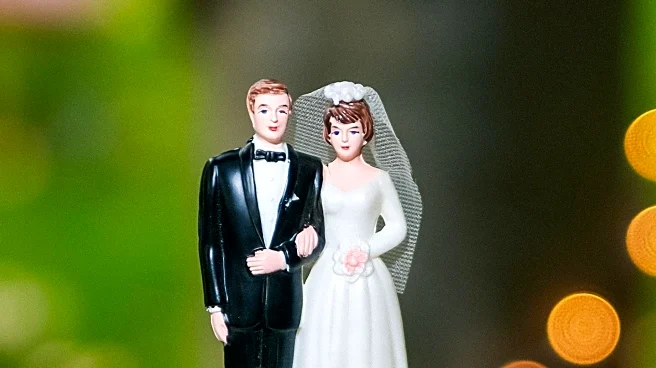What's Happening?
The tradition of changing one's name after marriage, particularly among straight couples, is undergoing significant changes. Historically, this practice was rooted in patriarchal traditions dating back to medieval England, where women were seen as property transferred from father to husband. In the United States, while not legally required, it has been a common practice for women to adopt their husband's surname. However, recent trends indicate a shift, with more women choosing to retain their maiden names or opting for hyphenated surnames. A Pew Research study from 2023 revealed that 80% of women in opposite-sex marriages changed their names, but younger generations are increasingly keeping their surnames. This change is influenced by professional considerations and personal identity, as well as the feminist movement.
Why It's Important?
The decision to change one's name after marriage carries significant implications for personal identity and societal norms. For many, a shared surname symbolizes family unity and simplifies matters for future children. However, the growing trend of retaining maiden names reflects broader societal shifts towards gender equality and personal autonomy. This change challenges traditional gender roles and highlights the importance of individual identity within marriage. It also impacts professional life, as many women are known by their maiden names in their careers. The trend suggests a move towards more egalitarian relationships and could influence future legal and cultural practices regarding marriage and family identity.
What's Next?
As more women choose to keep their maiden names, it is likely that societal norms and legal practices will continue to evolve. This shift may lead to changes in how family identity is perceived and could influence policies related to marriage and name changes. Additionally, the trend may encourage more couples to consider alternative options, such as hyphenating names or creating new family names. The ongoing dialogue around this issue may also prompt further discussions on gender equality and the role of tradition in modern relationships.
Beyond the Headlines
The decision to change or retain a surname after marriage touches on deeper cultural and ethical dimensions. It raises questions about the balance between tradition and modernity, and the role of personal choice in shaping identity. The trend reflects broader societal changes towards valuing individual autonomy and challenging historical norms. It also highlights the intersection of personal and professional identities, as women navigate the complexities of maintaining their professional reputation while embracing new family roles.








